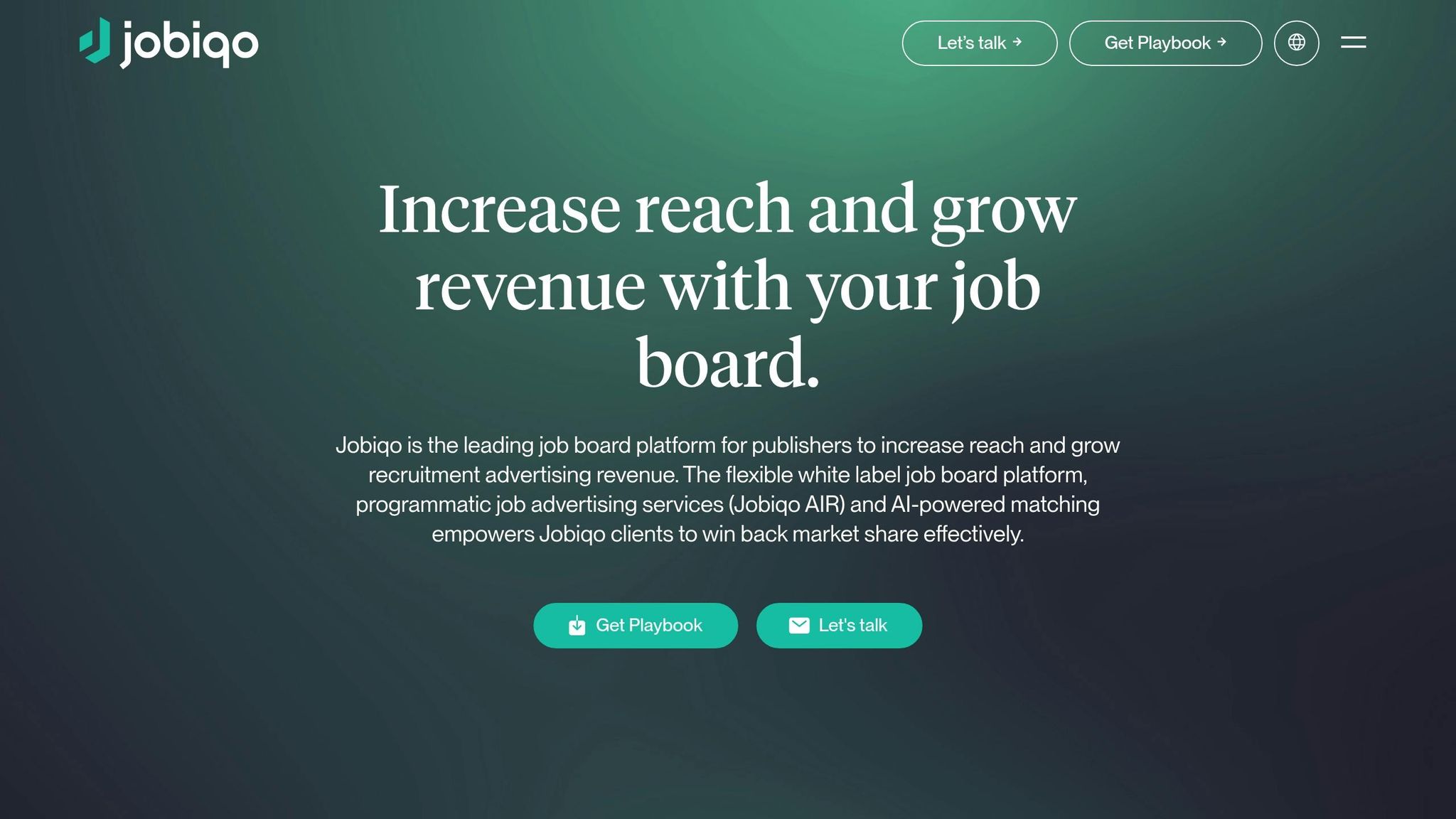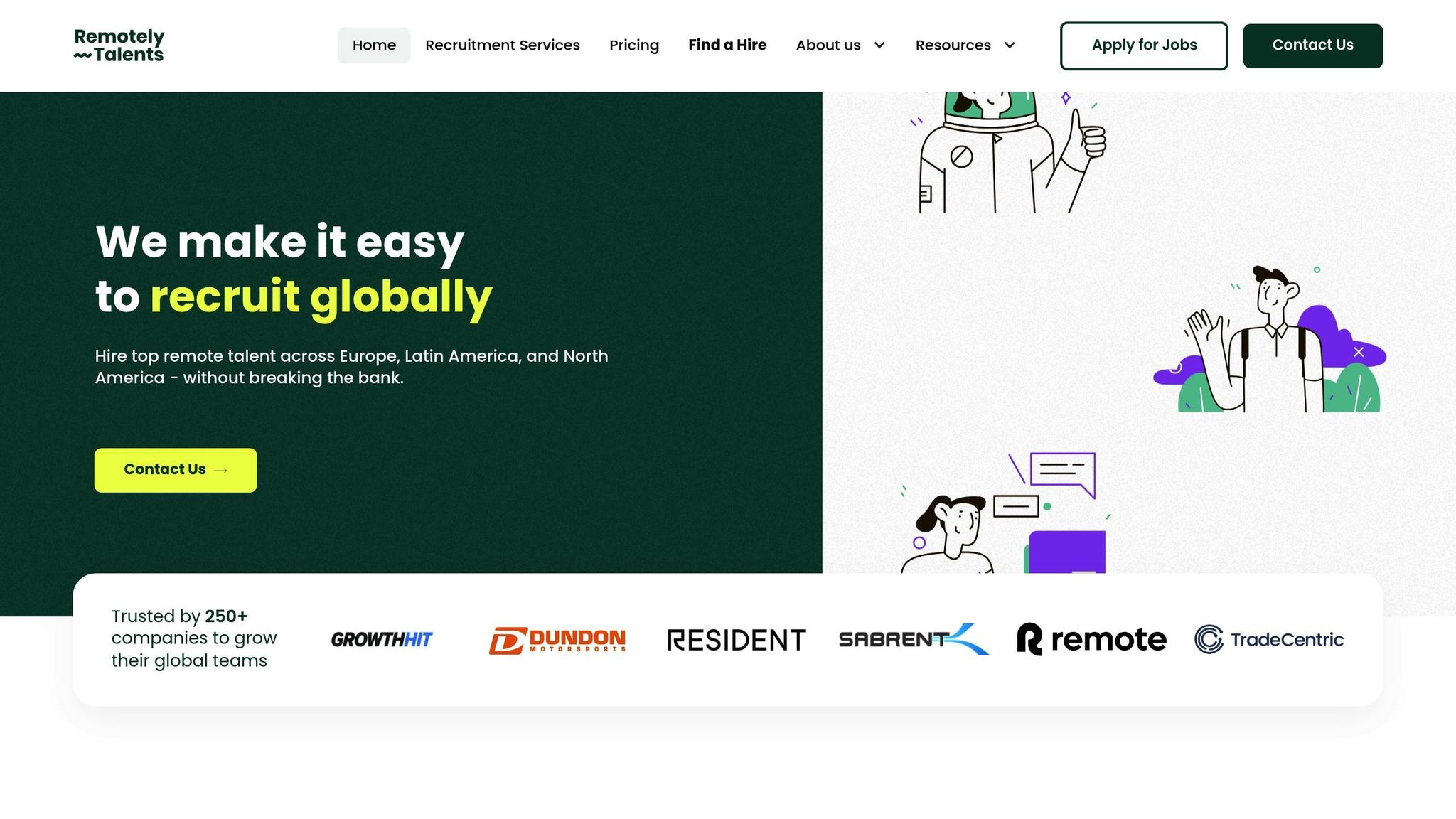How US Recruiters Can Hire Globally with White Label Partners

Hiring global talent is easier than you think. White label recruitment lets U.S. recruiters access international talent pools without the headaches of compliance, logistics, or setting up local operations. By partnering with experts who handle sourcing, screening, and legal requirements, recruiters can focus on client relationships while expanding their services.
Key Takeaways:
- What is White Label Recruitment? A service where third-party providers manage hiring tasks under your brand.
- Why It Matters: U.S. recruiters often face challenges like navigating foreign labor laws, time zones, and language barriers.
- How It Works: Recruiters manage client relationships while white label partners handle the operational side - sourcing, screening, and compliance.
- Benefits: Access to diverse talent, cost-effective hiring, and the ability to scale services without extra overhead.
This approach enables recruiters to offer global hiring solutions while maintaining their brand identity and building stronger client relationships. Let’s break down how it works and why it’s a game-changer.
Navigating the Future of Recruitment: Insights from Jobiqo's CEO Martin Lenz

How White Label Recruitment Works
White label recruitment offers U.S. recruiters a way to expand their hiring reach without stepping outside their brand identity. By partnering with international experts, they can seamlessly manage global recruitment while maintaining control over client relationships.
Step-by-Step Process
Here’s how the process typically unfolds:
When a U.S. recruiter receives a request for international talent, they don’t have to turn it down or struggle with unfamiliar territory. Instead, they partner with a white label recruitment provider to fulfill the request under their own branding.
The recruiter begins by consulting with their client to gather job details and understand the desired qualifications and cultural fit. This client-facing role remains consistent throughout the process.
Once the job requirements are clear, the recruiter shares the details and deadlines with the white label partner, who then takes the lead on the international search.
The white label partner taps into local networks to source and screen candidates, all while operating under the U.S. recruiter’s branding. This ensures a seamless experience for the client.
Shortlisted candidates are presented to the recruiter for review. The recruiter evaluates them and shares the final selections with their client, continuing to act as the primary point of contact.
Final interviews and negotiations often involve teamwork. While the U.S. recruiter handles client communication, the white label provider may assist with logistical challenges like coordinating time zones or providing insights into cultural nuances.
Placement and onboarding mark the final stages. The white label partner typically manages compliance and legal requirements specific to the candidate’s location, while the recruiter focuses on ensuring the client is satisfied with the process and outcome.
This step-by-step approach clearly defines the roles of each party, allowing for a smooth and efficient collaboration.
Roles of U.S. Recruiters vs. White Label Partners
The success of white label recruitment lies in the well-defined division of responsibilities. Each party plays to their strengths, ensuring the process runs smoothly while maintaining the U.S. recruiter’s brand integrity.
U.S. recruiters are responsible for managing the client relationship. They handle consultations, present candidates, lead interviews, and negotiate terms. This allows them to preserve the trust and rapport they’ve built with their clients while offering expanded services.
White label partners, on the other hand, handle the operational side of recruitment. They specialize in sourcing candidates through local networks, conducting initial screenings, and navigating the complexities of cross-border hiring. Their expertise includes managing compliance with local labor laws and coordinating logistics like time zones and cultural considerations.
Collaboration is key. Both parties stay in sync through regular communication, ensuring alignment on candidate quality, timelines, and any necessary adjustments based on client feedback. The recruiter’s knowledge of the client, combined with the partner’s international expertise, creates a powerful combination.
Quality control is a shared effort. The recruiter provides feedback on the candidates, and the white label partner refines their search as needed. This ongoing collaboration ensures better results and a stronger partnership over time.
Benefits of Working with White Label Providers
White label recruitment partnerships offer U.S. recruiters a unique opportunity to expand their global reach while optimizing operations. These collaborations simplify access to international talent and improve the overall efficiency of recruitment processes.
Access to Global Talent Pools
White label providers connect U.S. recruiters to talent markets that might otherwise be out of reach. With established networks across regions like Europe, Latin America, and Asia, these partners bring years of local market expertise to the table.
One standout feature is the integration of AI tools for smarter candidate matching. These platforms use AI-driven engines to sift through thousands of profiles, quickly identifying the most relevant candidates for remote roles [1][2]. This advanced technology significantly reduces the time and effort required to find top talent.
White label providers also build and maintain talent pools using a mix of HR technology, marketing automation, and personal interactions. By running targeted campaigns and partnering with popular job boards, they attract a wide range of qualified candidates actively seeking remote opportunities [3]. For U.S. recruiters, this means instant access to a pipeline of professionals who are ready to work.
The diversity within these talent pools is particularly impressive. Recruiters gain access to candidates with multilingual skills and experience working across various time zones. Some providers even offer curated batches of pre-vetted candidates, ensuring high-quality matches right from the start [1].
Cost-Effective and Scalable Solutions
When compared to building internal global hiring capabilities, white label recruitment offers a more affordable and flexible alternative. U.S. recruiters can avoid the steep costs of setting up local offices, hiring regional staff, and navigating the legal complexities of compliance across multiple countries.
Many white label providers operate on subscription models, replacing unpredictable placement fees with steady, manageable monthly costs. This structure makes it easier - and less risky - to explore international hiring opportunities.
Scalability is another major advantage. White label partners can quickly ramp up operations during busy periods, handling multiple searches simultaneously without requiring long-term commitments. During slower periods, recruiters avoid the burden of fixed overhead costs.
Automation tools further enhance efficiency. Features like CV parsing and AI scoring help streamline the recruitment process without compromising quality [1]. Additionally, these platforms often include multi-currency functionalities [2], simplifying the challenges of managing international payments and contracts. By reducing financial and operational hurdles, white label solutions allow recruiters to focus on what truly matters - building relationships.
Focus on Client Relationships
One of the biggest perks of white label recruitment is the ability to prioritize client relationships. While the white label partner manages the logistical complexities of global hiring, U.S. recruiters can concentrate on understanding their clients’ needs, offering strategic advice, and ensuring satisfaction.
This division of responsibilities creates a seamless experience for clients. Recruiters retain their role as trusted advisors while significantly expanding their service offerings. With reliable backend support, they can confidently take on international assignments they might have previously declined.
Brand consistency is another key benefit. White label providers ensure that all communications and interactions appear to come directly from the U.S. recruiter, maintaining the integrity of client relationships. Clients remain unaware of the third-party involvement, which helps preserve trust and long-term loyalty.
Additionally, white label platforms allow recruiters to publicly list jobs and candidates on global marketplaces. This expanded visibility attracts a diverse pool of qualified candidates and helps U.S. recruiters establish their reputation in international markets - without the need for direct investments in marketing or branding abroad [1].
Ultimately, white label partnerships empower U.S. recruiters to offer premium global services while focusing on their core strengths. They can say "yes" to more opportunities, driving revenue growth and strengthening client relationships along the way.
Challenges and Considerations When Using White Label Partners
While white label recruitment can bring plenty of benefits, U.S. recruiters must also navigate certain challenges to ensure these partnerships work effectively. Knowing the potential hurdles and taking steps to address them can make the difference between a smooth collaboration and a costly misstep.
Quality Control Requirements
One of the biggest challenges lies in maintaining high-quality standards when working with external partners. Since these white label providers represent your brand, it's essential that they deliver candidates who meet your expectations and uphold the professional image you've built with your clients.
To avoid mismatched expectations, U.S. recruiters should clearly define their hiring needs from the start. This includes outlining the type of talent required - whether contract, contract-to-hire, or direct-hire - along with budget considerations, the rarity of the roles, and alignment with corporate culture [4]. Laying this groundwork helps set the tone for a successful collaboration.
Tracking performance through key metrics is another critical step. Important KPIs include:
- Time-to-hire
- CV-to-interview rates: Ideally 50% or higher, with top-performing recruiters reaching 90-100%.
- Interview-to-offer rates: For example, 80% for three qualified candidates.
- Cost per hire
- Offer acceptance rate
- Retention rates
Additionally, researching a partner’s reputation can provide valuable insights. Look for client testimonials, case studies, awards, and growth indicators. Platforms like LinkedIn can also offer a glimpse into past client experiences [4][5]. This due diligence ensures you’re teaming up with a partner who consistently delivers results.
Technology plays a key role in quality assurance too. Using tools like automation, data analytics, and AI can help monitor performance and flag potential issues early, creating a more reliable partnership.
Managing Compliance Across Borders
When hiring internationally, legal requirements can quickly get complicated. Employment laws, tax regulations, visa rules, and worker classifications vary widely between countries. For U.S. recruiters unfamiliar with these regional differences, the risk of non-compliance can be significant.
The complexity grows when dealing with multiple jurisdictions at once. A practice that’s perfectly legal in one country might violate regulations in another. And since these laws are constantly evolving, staying compliant requires specialized knowledge that most U.S. recruiters don’t have in-house.
Many white label partners include compliance management as part of their services. They bring expertise in local labor laws, handle payroll, and ensure proper worker classification. However, it’s up to U.S. recruiters to confirm that their partners truly have the expertise and up-to-date processes needed to navigate these complexities.
Conducting regular compliance audits can help catch potential problems early. It’s also important to establish clear protocols for addressing compliance questions and ensure your partner can provide accurate, timely guidance on regulations in the regions they operate.
Pricing Models Comparison
White label recruitment providers generally offer three main pricing models, each with its own set of advantages and challenges:
| Pricing Model | Structure | Best For | Typical Range | Pros | Cons |
|---|---|---|---|---|---|
| Placement Fees | Percentage of candidate's salary | Occasional hiring needs | 15-25% of salary | Pay only for successful hires | Costs can skyrocket, especially for senior roles |
| Subscription-Based | Fixed monthly fee | Regular hiring volume | $1,000-$2,500/month | Predictable costs, unlimited searches | Monthly expense regardless of hiring success |
| Retained Model | Upfront + success fee | Executive or specialized roles | $5,000-$15,000 upfront + 10-15% | Dedicated focus | Higher upfront costs, complex fee structure |
For recruiters with sporadic hiring needs, placement fees can work well. However, these costs can add up quickly for senior-level roles. For instance, hiring a software engineer with a $120,000 salary could result in fees between $18,000 and $30,000.
On the other hand, subscription-based models offer more predictable expenses, making them a good fit for recruiters planning consistent hiring. These models often allow multiple active searches, providing better value for companies hiring four or more international candidates annually.
Retained models are ideal for executive or highly specialized roles that require dedicated attention. While they justify the higher costs, the upfront investment and complex fee structures can pose challenges for smaller firms.
When comparing pricing models, it’s crucial to evaluate the resources your white label partner brings to the table. Their talent pool and market insights can greatly influence the overall value you receive, regardless of the pricing structure [4].
Ultimately, the right pricing model depends on your client base and hiring patterns. Recruiters working with enterprise clients who have steady international hiring needs might find subscription models more suitable. Meanwhile, those handling occasional, specialized searches might lean toward placement-based pricing, even if it comes with higher per-hire costs. Careful consideration of these factors is essential when choosing the right partner.
sbb-itb-88a7fe6
How to Choose the Right White Label Partner
Picking the right white label partner can significantly influence the success of your global recruitment strategy. With so many options available, it’s essential to focus on tangible factors rather than flashy marketing promises. Below, we’ll cover the key criteria to ensure a smooth and effective global hiring process.
Key Selection Criteria
Focus on geographic expertise. A partner with strong networks in specific talent regions can often outperform those with generic, broad coverage. For instance, a provider specializing in Europe or Latin America may offer deeper insights and better results in those areas.
Time zone alignment matters. If you’re hiring for clients on the East Coast and targeting talent in Latin America, having overlapping business hours makes coordination easier. Similarly, European talent often aligns well with U.S. companies due to existing business relationships and shared work practices.
Industry specialization is a game-changer. A partner who understands the unique requirements of hiring software engineers will approach sourcing, screening, and salary benchmarks differently than one focused on marketing roles. Always ask for case studies or examples that demonstrate their expertise in your industry.
Technology and transparency are non-negotiable. Your partner should provide real-time visibility into their recruitment process. Tools like applicant tracking systems, AI-powered sourcing platforms, and performance dashboards can streamline operations and keep you informed every step of the way.
Clear communication channels are essential. Whether it’s through Slack, weekly updates, or a dedicated account manager, you need consistent visibility into the hiring progress to ensure everything stays on track.
Candidate quality and screening processes impact your reputation. Ask about their vetting methods, including technical skills assessments, language tests, and cultural fit evaluations. The best partners will have rigorous, standardized procedures to ensure only top-quality candidates are presented.
Transparent pricing avoids surprises. Make sure your partner provides a clear breakdown of costs, including what’s included in their services and any potential additional fees.
Replacement guarantees show confidence. Look for partners offering at least a 90-day replacement guarantee. This demonstrates their commitment to finding candidates who are not only qualified but also a good long-term fit.
By sticking to these criteria, you can enhance your global hiring capabilities while protecting your brand’s reputation.
Why Remotely Talents is a Trusted Partner

Remotely Talents stands out by meeting - and often exceeding - these criteria. Their specialization in Europe and Latin America allows them to deliver better results in these regions compared to providers with a broader but less focused approach.
Their subscription-based pricing model ensures transparency and predictability. For example, the On-Demand Plan costs $1,450 per month per open role, while the Partner Plan is $1,000 per month with a 12-month commitment. This structure eliminates hidden fees, and for recruiters managing 4-6 hires annually, the Partner Plan can save over $5,400 compared to traditional placement fees.
With experienced recruiters and account managers, searches are handled with care and attention, avoiding reliance on junior staff or automated systems. They also provide weekly updates and dedicated Slack channels, ensuring you’re always in the loop.
Their 90-day replacement guarantee underscores their confidence in delivering high-quality candidates who are a strong fit for the role. For U.S. recruiters, this adds a layer of security when working with international talent.
Remotely Talents also delivers results quickly, with an average recruitment timeline of 4-6 weeks and 3-4 qualified candidates presented within two weeks. Their focus on C1+ English proficiency addresses one of the most common challenges U.S. companies face when hiring internationally.
For recruiters in the U.S. looking to expand globally without the hassle of building their own international infrastructure, Remotely Talents offers a well-rounded solution. Their combination of regional expertise, transparent pricing, and dedicated support makes it easier to scale hiring efforts and meet client demands effectively.
Use Cases for White Label Recruitment
Examples from the field show how white label recruitment can be a game-changer for U.S.-based recruiters. These scenarios emphasize its benefits in terms of cost savings, faster results, and improved candidate quality.
Hiring Engineers in Latin America
An Austin-based staffing firm faced a challenge when a fintech client sought to grow its engineering team with talent from Latin America. The client needed senior software engineers who not only had technical expertise but also understood U.S. business practices and local regulations. To tackle this, the firm teamed up with a white label provider specializing in the region. With the provider's local knowledge, the firm quickly sourced and presented several highly qualified candidates under its own branding. Throughout the process, the staffing firm maintained control over client interactions and final hiring decisions, ensuring a seamless experience. The result? The client received top-tier talent tailored to their needs.
Scaling Marketing Teams Across Europe
A Chicago-based agency used white label recruitment to help an e-commerce client expand its marketing operations across Europe. The client aimed to establish a presence in key markets like Germany, France, and the Netherlands. Instead of building local recruitment teams from scratch, the agency partnered with a white label provider with established networks in these regions. This partnership allowed the agency to tap into local talent pools and efficiently source and screen candidates for critical marketing roles. Operating under its own brand, the agency successfully supported the client's European expansion without the hassle of managing local hiring logistics.
Adding Global Hiring as a Service
Recognizing a growing demand for international recruitment, a Denver-based HR consulting firm decided to expand its service offerings. Many of its enterprise clients were looking to hire globally, but the firm lacked the resources to manage such searches in-house. To bridge the gap, they partnered with a subscription-based white label provider offering recruitment support in Europe and Latin America. With a predictable monthly pricing structure, the firm handled multiple international searches at once, sourcing talent for roles ranging from software development to customer success and finance. This approach allowed the HR firm to broaden its services and strengthen relationships with clients by positioning itself as a one-stop solution for global hiring needs.
Conclusion: Why White Label Partners Are Key to Global Recruitment
White label partners are reshaping how U.S. recruiters approach the global talent market. As international hiring becomes more accessible, this model provides a way to navigate the challenges of global recruitment while turning them into a competitive edge.
By collaborating with white label providers, U.S. recruiters can tap into global talent pools without the need to build local offices, handle complex compliance issues, or develop regional expertise. This approach ensures seamless access to diverse candidates while maintaining the recruiter’s brand identity.
The financial benefits are equally appealing. White label recruitment eliminates the need for heavy upfront investment in international operations, making global hiring both predictable and scalable. Whether it’s a staffing agency in Austin sourcing engineering talent from Latin America or an HR firm in Denver managing international searches, this model allows businesses to quickly scale their efforts to meet client demands. Such flexibility is crucial in today’s rapidly changing business environment.
This partnership also enables recruiters to focus on their strengths - building relationships and understanding client needs - while leaving the intricacies of international sourcing and compliance to experts. By dividing responsibilities, both parties can maximize their expertise, creating a mutually beneficial arrangement.
Ultimately, white label partnerships offer a low-risk way for U.S. recruiters to deliver global hiring solutions under their own brand. Without the overhead of setting up international operations, recruitment firms can position themselves as leaders in the evolving global talent market. This approach equips them to seize new opportunities and remain competitive as the industry continues to expand its international reach.
FAQs
How can U.S. recruiters maintain quality when partnering with white label recruitment providers?
To ensure high standards when collaborating with white label recruitment providers, U.S. recruiters should focus on a few critical areas: the partner’s expertise in the field, their regional specialization, and the technology and tools they rely on. It’s also essential to prioritize transparency - make sure they clearly outline their processes and provide measurable outcomes.
Being actively involved in key stages, like candidate interviews, can help ensure that the candidates align with client expectations. Many providers also back their services with guarantees, such as replacement policies, offering added assurance for long-term hiring success.
What compliance challenges might U.S. recruiters face when hiring internationally through white label partners?
Recruiters in the U.S. face a range of compliance hurdles when hiring internationally through white-label partners. One major challenge is staying aligned with labor laws, licensing rules, and employment regulations that differ widely from one country to another. Without the right legal guidance, there’s a real risk of falling out of compliance and running into legal trouble.
Another critical area is navigating international anti-discrimination laws and export control regulations. Ensuring hiring practices meet these standards can be tricky and often demands a deep understanding of local employment laws - or access to dependable legal advisors - to manage these complexities and reduce risks.
How can white label recruitment providers help U.S. recruiters reduce costs when hiring globally?
White label recruitment providers offer U.S. recruiters a way to save money by providing ready-made solutions that bypass the need for costly local infrastructure, like sourcing teams or compliance departments. Instead of investing in in-house specialists or expensive technology, recruiters can tap into the provider’s well-established systems and expertise.
This approach not only cuts overhead costs but also simplifies operations and speeds up market expansion. At the same time, it frees recruiters to concentrate on building strong client relationships. By teaming up with white label providers, U.S. recruiters can offer global hiring solutions efficiently and under their own brand, all while keeping expenses in check.
Related Blog Posts
Read also
Ready to get started?
If you want to dive into the details just Book a Free Consultation with our staff and we’ll be happy to answer your questions.





